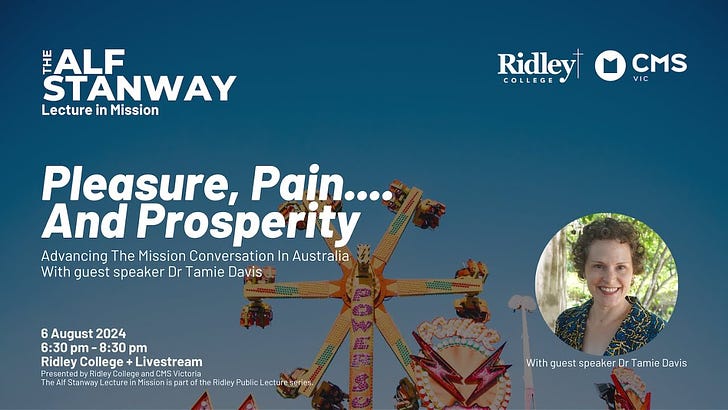Reaching Swifties with African Prosperity Gospel
Can Africans teach us how to evangelize people in a "feelings" based culture?
Several weeks ago I attended an amazing lecture by Dr. Tamie Davis on “Pleasure, Pain ... And Prosperity: Advancing The Mission Conversation In Australia.”
Dr Tamie Davis is a missiologist who served in Tanzania for 10 years, partnering with the Tanzania Fellowship of Evangelical Students. She is a Mentor with the Angelina Noble Centre and Mobilisation Lead for CMS SANT. Her PhD explored the prosperity theology of a group of Tanzanian women.
The Alf Stanway Lecture is jointly hosted by Ridley College and the Church Missionary Society.
Her thesis is, in a nutshell, that majority world theology is growing as the Spirit of Christ grows God's people in both breadth and depth. What might Christianity in Australia stand to gain from it? This lecture will propose that a Tanzanian theology of prosperity points to a way for God to be known from within Australia’s secular pleasure/pain worldview.
Let me be clear. Davis was not advocating for prosperity gospel in terms of Kenneth Copeland or Benny Hinn. Africa has imported the prosperity gospel from North America, often amplifying the worst aspects of it, but also indigenizing it and taking it in different directions.
Her research shows that African prosperity gospels can lead people to expect God’s blessing and joy even while believing that they have to work at their spiritual life. In other words, it often marries together a theology of victory with a Protestant work ethic!
It is a truly fascinating lecture that brings together cultural observations, theology, hermeneutics, and evangelism.
Maybe a theology with a bigger emphasis on experience, feelings, and “doing” can reach a generation of people, like the Swifties, who live life in a pleasure/pain dichotomy.
Watch it and let me know what you think in the comments below!




That is fascinating. Often African Pentecostalism is labeled prosperity gospel and that’s the reason why it’s flourishing. But this research suggests that the American PG label doesn’t necessarily fit. The possible application in secular culture makes sense too as secular individualists tend to “calculate” towards their personal gain and goals.
I want to know more.